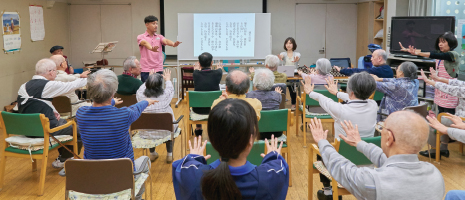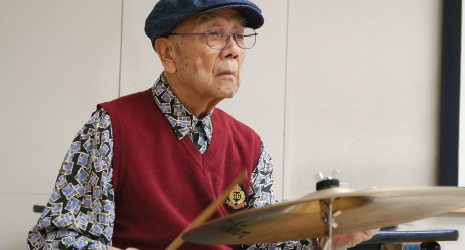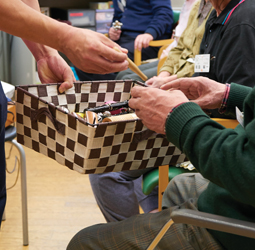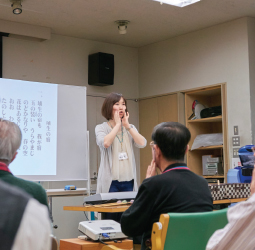Home > Highlighting JAPAN >Highlighting Japan December 2015>A Society of Health and Longevity
Highlighting JAPAN


Keeping the Rhythms of Life
LiryMusica’s “music facilitation” program offers interactive musical interludes at nursing homes. By sharing the joy of music with seniors, LiryMusica engages them in an entertaining pursuit that brightens both their days and their minds.
Music therapy has been shown in multiple studies to have beneficial effects in treating cognitive impairments. “But our program, in which we dispatch experts to adult living facilities to engage our target audience in musical activities, is not music therapy,” notes Moe Shibata, the founder and director of a business called LiryMusica. Shibata studied music therapy at a college of music, but she felt its methodology, which focused on the effects of therapy on individual patients, was too limited. She thus began pursuing her own idea of “music facilitation.”
“For us, it’s important for everyone to be free to enjoy music in a relaxing setting so we can help bring the smiles back to their faces,” Shibata explains. “By offering music in a program with a high degree of freedom and no pressure to participate, we want people to discover that even seniors with cognitive impairments can really enjoy music and find their smiles again.”
LiryMusica holds its programs during recreational activity periods at a hundred adult living facilities each year, with Shibata herself handling activities at about twelve of them. The response has been fantastic, Shibata says. “Even if people hate karaoke or certain genres of music, there’s no one who hates music itself.”
Those who are not in the mood aren’t forced to join in, but because they are in the same space they can still hear the music. Listening to popular songs and old tunes brings back memories, and even those seniors who refuse to participate in karaoke eventually start humming along. One symptom of cognitive impairment is the tendency to fall into an aggressive restlessness when visitors drop by, but even those seniors look forward to LiryMusica’s regular visits once or twice a month.
At a recent LiryMusica session at the Day Home Setagaya daytime care center in Tokyo, about twenty seniors have appeared, both walking independently and in wheelchairs, and they’re smiling as they wait for Shibata to finish setting up the instruments and equipment. One particularly active member of the group, Tomiji Yamada, who is eighty-five, is engaged in a preliminary tête-à-tête with Shibata. According to Day Home Setagaya director Michiko Kidaka, “Mr. Yamada originally came to us on a different day, but he has exceptional music skills, so he really enjoys LiryMusica’s music time and volunteers to participate.”
Yamada had long been employed in office jobs, but for over five decades has also put his skills to use on a semiprofessional basis by playing with a live house band in Tokyo. He writes parodies of pop songs that he sings himself while playing a ukulele, and also accompanies Shibata on drums. The other seniors watch and listen attentively to the show being put on by their friend Yamada and Shibata; they follow the lyrics shown onscreen, hum along with the music, and clap to the beat. Some of the audience members actually have aphasia—they cannot talk or hold conversations—yet it is impressive to see many of them are swaying to the music and enjoying themselves.
“Our job is to introduce music into this setting in a flexible and fun manner, draw everyone in, and help improve their quality of life,” says Shibata. “We want to take a constructive approach to our aging society. We know that we in the younger generation will one day be in those shoes as well, so we want to create an environment that we would want to put our own parents in, and maybe one day be in ourselves.”
© 2009 Cabinet Office, Government of Japan








